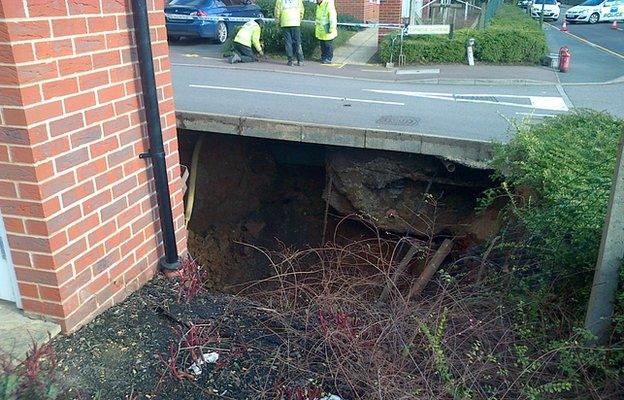British sinkhole spike prompts warning
- Published
- comments
David Shukman examines how and why sinkholes form
Britain is likely to face the strange and disturbing threat of more sinkholes opening up in the weeks and months ahead.
The warning comes from the British Geological Survey (BGS), which has been studying a recent spate of collapses across the country.
In a typical year, geologists would expect to see one or two sinkholes appearing, but this month's tally has reached six so far.
Dr Tony Cooper of the British Geological Survey told me that some areas of the country are more susceptible than others, depending on the type of rock involved.
Gypsum is vulnerable to being rapidly eroded by water - and this is what underlies Ripon where a house collapsed when a sinkhole appeared this morning.
Dr Cooper said: "If you took a chunk of gypsum the size of a van and left it in a river it would be dissolved in about 18 months."
Another key factor is the nature of the geology itself: Some rocks host networks of natural caverns while others are riddled with old mineshafts.
Depending on the soil and rock suspended above these cavities, a sudden incursion of water from heavy rainstorms can lead to massive strains and, ultimately, to collapse.
One particularly large sinkhole opened in Hemel Hempstead on Saturday - and the hole has expanded since then.
As many as 20 families have been forced to evacuate, 12 because their homes are deemed to be unsafe and the rest because gas supplies have had to be cut off.
Concrete solution
The hole itself runs under the corner of a house and under part of road. The tarmac has collapsed and the bare earth lies exposed.
The engineer brought in to examine the site, Clive Edmunds, told me he was hoping to fill the hole with concrete later this week.
"We estimate that it will need between 100-200 cubic metres of concrete - which is equivalent to 10-20 truck loads but there may be connections to further voids below," he said.
The house above the hole is still standing but there are fears that it may collapse soon. The road beside it is slightly buckled.
Such is the danger that neighbours were warned to leave so rapidly, many have had to abandon cars in their driveways.

Another, 35ft-wide, hole opened up in Hemel Hempstead at the weekend
Although sinkholes open up for all kinds of reasons, by far the most common cause is a sudden influx of water.
This winter's rain is the obvious suspect and its effects look set to continue.
Dr Cooper believes further sinkholes are likely and not only because of the saturated ground.
"I do expect to see more of these - we are seeing a much higher rate than normal," he said.
One cause can be changes in the flow of groundwater, including when it is drained away which means the process of drying out may trigger another spate of these strange threats.
Even at a safe distance, the sinkhole at Hemel Hempstead was a surprisingly frightening sight.
One of life's greatest certainties is that the ground is solid beneath one's feet so the sudden appearance of chasms, however small, is unsettling.
The 20 families who have to move out of their homes in Hemel Hempstead have no idea how long they will need to stay away.
The housing association which runs the estate hopes the first families will be allowed back in a week but officials acknowledge it may take much longer.
This is shaping up to be yet another painful legacy of Britain's winter of storms.